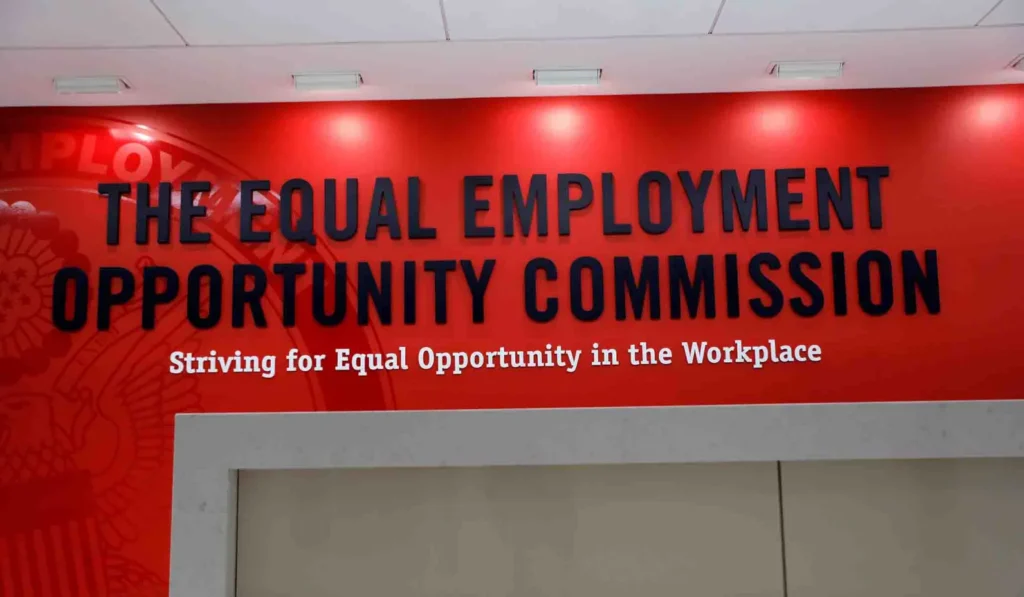
Published October 6, 2023
If you haven’t yet heard, the Equal Employment Opportunity Commission is seeking to impose an abortion mandate on employers nationwide, forcing them to accommodate their employees’ abortions. This mandate, which is open for public comment until Tuesday, October 10, was revealed by the EEOC in August in its proposed regulations implementing the Pregnant Workers Fairness Act (PWFA). (You can read my summary of the EEOC’s expansive proposal here.)
While the EEOC’s abortion mandate may come as a surprise to some, it shouldn’t. Before the PWFA was passed in December 2022, I warned that this is precisely what the EEOC would do.
The PWFA provides long-overdue protections to pregnant women in the workplace by requiring employers to provide their employees with reasonable accommodation for “the known limitations” related to “pregnancy, childbirth, and related medical conditions” unless it poses an undue hardship on the employer. Congress gave EEOC rulemaking authority to implement the act.
As I explained last December, while the PWFA was being debated on the Senate floor,
An open question under the act is how expansively “related medical conditions” would be interpreted by the EEOC and the courts. EEOC’s (non-legally binding) pregnancy guidance states: “Title VII protects women from being fired for having an abortion or contemplating having an abortion.” Courts have generally found that abortion is a pregnancy-related medical condition and that discrimination based on abortion is sex discrimination under the [Pregnancy Discrimination Act (PDA)], aside from the PDA’s abortion exclusion for health-insurance benefits. Indeed, prominent abortion groups, such as Planned Parenthood and NARAL Pro-Choice America, are among those who advocate support for the PWFA.
It is almost certain that “related medical conditions” will be interpreted to include abortion, requiring all employers, even pro-life or religious organizations, to provide abortion accommodations.
The EEOC’s abortion mandate falls squarely in line with the Biden administration’s extreme (and sometimes unlawful) pro-abortion policies. Why would the EEOC, which now has a Democratic majority, do anything different?
Although the EEOC’s abortion mandate is not surprising, there are good arguments for why it is not a lawful interpretation of the act.
First and most obvious, there is no mention of abortion in the text of the PWFA.
The PWFA makes clear that employers are required to accommodate “the known limitations,” defined as physical or mental conditions related to, affected by, or arising out of pregnancy, childbirth, or related medical conditions. While abortion is a medical procedure, it is not a medical condition. As such, under the plain reading of the text, abortion is not a “known limitation” or a “related medical condition” that employers must accommodate.
Because the phrase “pregnancy, childbirth, or related medical conditions” is used in Title VII, the EEOC proposes giving it “the same meaning under the PWFA as under Title VII.” In support of abortion being a “related medical condition,” the EEOC cites two circuit court cases, a district court case, and its Title VII pregnancy-discrimination guidance.
Three pre-Dobbs court decisions, including one by a district court, involving employee terminations, hardly create an established interpretation of Title VII nationwide, much less of the PWFA. More important, the Supreme Court has never held that Title VII’s prohibition against discrimination “on the basis of pregnancy, childbirth, or related medical conditions” covers abortion.
Further, in issuing regulations implementing the PWFA, the EEOC is not bound by Title VII case law nor the agency’s Title VII pregnancy guidance. Notably, the PWFA did not amend Title VII; it is a separate law with separate considerations.
As former EEOC general counsel Sharon Fast Gustafson and I explain, there are significant differences between Title VII and the PWFA. The PWFA is not a general nondiscrimination law like Title VII; it requires accommodations for a protected basis. Specifically, the PWFA requires accommodations only for “the known limitations,” a phrase not found in Title VII. These distinctions counsel against automatically interpreting “pregnancy, childbirth, or related medical conditions” under the PWFA identically to Title VII.
While it makes sense to consider an employer’s decision not to hire a woman because she was or might become pregnant an employment decision “on the basis of pregnancy” in violation of Title VII, it stretches the imagination that an employer would be providing a pregnancy accommodation for a woman who is not actually pregnant or seeks to end that pregnancy electively. Indeed, the PWFA requires accommodations for pregnancy and childbirth, not for electively ending the pregnancy and killing a child.
The PWFA is fundamentally pro-pregnancy and pro-childbirth. Abortion is neither. Unlike the PDA, it was passed in a post-Roe world when abortion is no longer protected as a right under the United States Constitution.
Abortion was and remains a controversial and polarizing topic. And it has become even more contentious since the Supreme Court in Dobbs returned “the issue of abortion to the people’s elected representatives.” In response, blue states have made abortion more accessible and affordable, while red states are passing laws to limit abortion and protect unborn human lives.
It was in this context that the PWFA was passed with broad bipartisan support. It was co-sponsored by Democrats and Republicans. Both Planned Parenthood and the United States Conference of Catholic Bishops supported it.
It defies reason to believe that a bill mandating that American employers accommodate their employees’ abortions would garner that kind of support. As Senator Patty Murray (D., Wash.), the Health, Education, Labor and Pensions Committee chairwoman, said, “I can’t think of a more commonsense, less controversial bill.” It’s hard to think of anything more controversial than abortion.
When abortion concerns in the PWFA were raised on the Senate floor by Senator Thom Tillis (R., N.C.) on behalf of himself and Senators James Lankford (R., Okla.) and Steve Daines (R., Mont.), lead Republican co-sponsor Senator Bill Cassidy (La.) responded, “I reject the characterization that [the PWFA] would do anything to promote abortion.” Lead Democratic co-sponsor Senator Bob Casey (Pa.) agreed, explaining that the EEOC “could not . . . issue any regulation that requires abortion leave, nor does the act permit the EEOC to require employers to provide abortion leave in violation of State law.”
Pro-abortion and left-wing media blasted Senator Tillis for even thinking such a thing. For example, in response to his abortion-accommodation concerns, HuffPost stated such claims were “inaccurate” because “the bill would do no such thing”; the Washington Press claimed it was “misinformation” and “an assertion that can’t be further from the truth”; and the Mary Sue explained, “To be clear, this bill does not do that. . . . Again, that’s not what his bill does. Like, at all.”
And why would they think the PWFA promoted abortion when the bill’s sponsors vehemently denied that it did any such thing? Even pro-abortion and left-wing groups were mum about abortion in their letters and press statements supporting the bill. See here, here, here, and here.
Of course, now that the PWFA has become law and the EEOC has proposed its abortion-accommodation mandate, these groups won’t complain. I don’t see anyone lining up to apologize to Senator Tillis for rudely dismissing his abortion concerns, which happened to be correct.
Perhaps the statements by Democrats, left-wing media, and pro-abortion groups were all just a giant ruse, and pro-life groups and Republicans such as Cassidy got played, maybe even willingly.
But at the end of the day, the EEOC will likely have to convince the judiciary that Congress sought to impose an abortion-accommodation mandate on employers across the country, even in pro-life states, sub silentio. Such a mandate is certainly a major question of vast political and economic significance — one that Congress must explicitly speak to.
EEOC’s proposal that employers accommodate employees’ killing their unborn children is not only unlawful but unjust. As I wrote in December, “the federal government should not force any employer — pro-life, religious, or otherwise — to be in the business of facilitating abortion.”
In finalizing its regulations, the EEOC should adhere to the statutory text and congressional intent of the PWFA, keep the PWFA pro-pregnancy and pro-childbirth, and leave abortion out of it.
Rachel N. Morrions is a fellow at the Ethics and Public Policy Center, where she directs EPPC’s HHS Accountability Project. She is a former attorney adviser at the Equal Employment Opportunity Commission.
Rachel N. Morrison is a Fellow at the Ethics and Public Policy Center, where she directs EPPC’s HHS Accountability Project. An attorney, her legal and policy work focuses on religious liberty, health care rights of conscience, the right to life, nondiscrimination, and civil rights.











